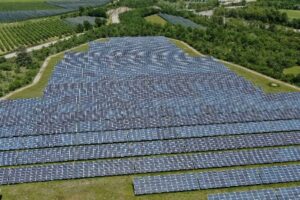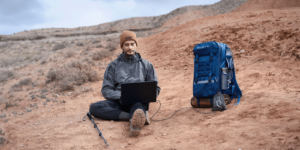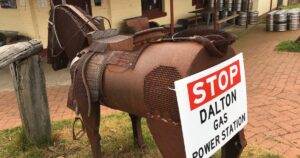Nikola hydrogen truck fraudster Trevor Milton sentenced to four years in prison in surreal court hearing

Trevor Milton, the founder and former CEO of hydrogen- and electric-truck manufacturer Nikola Motors, has been sentenced to four years in prison for securities fraud, and issued with a $1m fine, in a court hearing in New York today (Monday) that took an increasingly surreal turn when the defendant took to the stand.
Milton was convicted in October 2022 of making repeated false statements to investors in order to induce them to buy Nikola’s stock, including faking a working prototype of the Nikola One hydrogen semi truck in 2016.
The former Nikola CEO had asked for probation instead of jail time, arguing that prosecutors had miscalculated the loss to Nikola’s investors as a result of his fraud — claiming that losses were “zero”.
But the judge presiding over the case at the sentencing hearing ruled that the suggestion of zero loss was “untenable” given that the jury in Milton’s case had already determined that there was a loss.
He did, however, release Milton on bail, pending an expected appeal.
In a tearful petition on the stand, Milton attempted to gain the sympathy of the court by making reference to his heritage (he said he is one-quarter Cherokee), and embarking on a 30-minute soliloquy to give “detailed examples of who I am” to demonstrate why he should not go to prison.
Article continues below the advert
My mother told me how beautiful Heaven is, she’d visited… your purity is broadcast in colours
In reality, however, his turn on the stand became increasingly surreal the longer it went on, as he delved into the impact of historic injustices against Native Americans in Oklahoma, spoke about living in poverty in Brazil for selfless reasons (in which he claimed to have had his arm cut off by a glass door), and compared himself to African American boxer Rubin Carter, who was wrongfully convicted of murder in 1967.
“My mother told me how beautiful Heaven is, she’d visited,” he said, according to local journalist Matthew Russell Lee, who was live-tweeting the trial for Inner City Press. “My mother said there are colours in heaven that don’t exist on Earth. Your purity is broadcast in colours. For the first time in my life, excuse me, for the first time in your life, you are reviewed totally. Those who sought destruction were filth.”
He continued: “The process of repentance can take thousands of years on the other side. It is called Hell. Each decision is broadcast to billions of God’s creations. Our ability to absorb information is almost infinite. From that point on, I remember everything.
“One day my decision will be broadcast in Heaven for everyone to see. I did not commit those crimes. I’m not disput[ing] the verdict — I’m letting you know I didn’t do them.”
Milton also claimed to have stood down from Nikola in 2020 not because of the accusations of fraud, but because his wife was ill.
“I started Nikola because I wanted to leave this Earth cleaner than I found it,” he said, according to the Inner City Press. “I singlehandedly charged the vehicle industry. Hence why I always spoke in the present tense. I funded the company when no one else would. I took out hard money loans.”
In Milton’s original trial, however, it surfaced that the Nikola founder had very different personal aims than he described on the stand.
“In the early days of Nikola’s development, Milton freely admitted of his goals: ‘I don’t give a shit about the environment. I just want to make money’,” wrote the Southern New York District Attorney’s (DA) office in its sentencing submission last week, citing evidence from the trial.
Damian Williams, the DA for the district which brought the original charges against Milton, slammed the Nikola founder and former CEO for “refusing to take responsibility” for his crimes.
The government, which had recommended an 11-year sentence and $5m fine, calculated total investor losses as a result of Milton’s fraudulent statements at $660m-673m, adding that most of these losses were sustained by so-called “retail” or non-professional investors purchasing stock through brokers.
Losses were calculated by the government as the difference between the price of Nikola shares before 10 September 2022 and after a damning report from short-seller Hindenburg Research published on that date, which exposed many of the untruths underpinning what the government says was Nikola’s artificially high stock price.
The government also takes into account share declines occurring when Nikola issued a press release on 11 September denying the charges but giving no details at all, and those occurring when Milton resigned from his post on 21 September 2020.
Prosecutors say that shares declined by $13.15 after the Hindenburg Research report and Nikola press release, and a further $4.89 after Milton’s resignation, arguing that markets took the lack of detail in Nikola’s press release as giving substance to the short-seller’s accusations.
But Milton’s lawyers said that the Nikola press release should not be taken into consideration, arguing that prosecutors have “mischaracterised” his testimony and are using “unconventional” economics to reach their conclusions as to the losses suffered.
In fact, Milton argued, the losses suffered by Nikola’s investors is “zero”, a statement that was slammed by south New York’s district attorney last week.
“The objections to the [sentencing submission] are remarkable and relevant to sentencing in this matter only insofar as they cast light on the depth of the defendant’s refusal to accept responsibility for his own conduct or even to acknowledge the consequences that his actions have had on others,” Williams wrote in the government’s response to Milton’s objections in a letter to the court.
“The Court should take into account the defendant’s profound denial of accountability and insistence on blaming others in considering the history and characteristics of the defendant and the need for specific deterrence in this case, as a defendant who cannot acknowledge or consider any fault on his own part or even the harm to others is all the more likely to reoffend.”
Fraud
In 2016, when Milton was CEO, Nikola released a now infamous video of the Nikola One rolling down a hill in order to give the impression that the truck could move under its own power, which it could not.
Milton also falsely told investors that the company had engineered and built a prototype electric- and hydrogen-powered pick-up truck known as the “Badger” from the “ground up” using the company’s own parts and technology, when in fact the vehicle was a reworked Ford Truck.
“Milton claimed that… Nikola was producing hydrogen to fuel its vehicles, when it was not; that Nikola had driven the cost of producing hydrogen below $4/kg (which was critical to the viability of its business model), when it had not; that Nikola had reduced the cost of building a hydrogen station to below $14 million, when it had not; and that Nikola had contracts to purchase electricity for less than 4 cents per kilowatt-hour (also critical for its business plan), which it had not,” said the district attorney in the government’s sentencing submission.
And Milton also declared that Nikola had firm contracts worth billions of dollars with customers who had committed to purchasing Nikola’s vehicles, which was also false.
Citing evidence from some of Milton’s executive team at the time, prosecutors said that the former Nikola CEO had an “obsession” with the company’s stock price, especially after Nikola went public in 2020 following its merger with a special purpose acquisition company (SPAC) VectoIQ.
As a Nikola stockholder, Milton was preoccupied primarily with pushing up the stock price to inflate his own wealth, according to the district attorney’s sentencing submission.
When the company went public, Milton cashed in $100m in Nikola stock to buy a plane and an estate in the Turks and Caicos archipelago, a British overseas territory in the Caribbean.
And he made misleading statements about the company to persuade an individual to buy $8.5m in Milton’s personal stock options — which were later rendered worthless — as part payment for a ranch in Utah.
In today’s hearing, the judge ordered the ranch to be forfeited.
Nikola’s stock price was languishing at $0.93 at time of publication, despite Nikola recently launching its first hydrogen-powered truck, seven years after faking its first working prototype.
The company received a delisting notice from Nasdaq in May as its share price fell below $1 for 30 consecutive days, although it was rescued by a brief share price surge in June. However, the price has been below $1 since 5 December.




